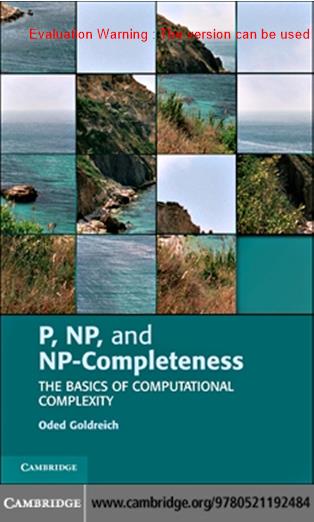《P, NP, and NP-Completeness The Basics of Computational Complexity)_Oded Goldreich》pdf电子书免费下载
下载方式一:
百度网盘下载地址:https://pan.baidu.com/s/1IclsrYojoVqQiWWFkVTvpQ
百度网盘密码:1111
下载方式二:
http://ziliaoshare.cn/Download/af_124062_pd_P,NP,andNP-CompletenessTheBasicsofComputationalComplexity)_OdedGoldreich.zip
|
|
作者:empty 页数:216 出版社:empty |
《P, NP, and NP-Completeness The Basics of Computational Complexity)_Oded Goldreich》介绍
The Basics of Computar ional ComplexityThe focus of this book is the P versus NP Question and the theory of NP-completeness.It also provides adequate preliminaries regarding computational p to blems and compu-tational models.The P versus NP Question asks whether finding solutions is harder than checkingthe correctness of solutions, An alternative formulation asks whether discovering proofsis harder than verifying their come ct ness.It is widely believed thar the answer to theseequivalent formu lutions is positive, and this is eap tured by saying that P is differentfrom NP
Although the P versus NP Question Tem na ins unresolved, the theory of NP-completeness offers evidence for the in tract ahilityofspecifcprohlems in NP by showingthat they arc universal for the entire class.Amazingly c nough, NP-complete pr able mscx ist, and hundreds of natural cam put ati anal problems arising in many different areasof ma them a lies and science are NP-compl cte.ODED GOLDREICH is a Profess ar of Computer Science a the Weizmann Institute ofScience and an In eu mnh ent of the Meyer W.We is gal Professorial Chair.He is an editorfor the SIAMJouralomComnpating, the Journal of Cryptology, and ComputationalComplexity and previously authored the books Moder Crypto gn api ry, ProbabilisticProofs and Pseudo ran cio m ness, the two-volume work Foundations of Cry pro graphy,and Compu lution al Complexity:A Concep lia al Perspective.
《P, NP, and NP-Completeness The Basics of Computational Complexity)_Oded Goldreich》目录
Contents
List of Figures
Preface
Overview
To the Teacher
Notations and Com ventions
Main Definitions and Resul rs
Computational Tasks and Models
Teaching Notes
l.1Representation
1.2 Computational Tasks
1.3 Uniform Models(Algorithms)
viii
L4Non-Uniform Models(Circuits and Advice)
1.5 Complexity Classes
1.2.1Scarch Problems
1.2.2 Decision Problems
1.2.3 Promise Problems(an Advanced Comment)
1.3.1 Overview and General Principles
1.3.2A Concrete Model:Turing Machines
1.3.3Un computable Functions
1.3.4 Universal Algorithms
13.5 Time(and Space) Complexity
1.3.6 Oracle Machines and Turing-Reductions
1.3.7 Restricted Models
L.4.1 Boolean Circuits
1.4.2 Machines That Take Advice
1.4.3 Restricted Models
Exercises
Teaching Notes
2.2.1 The Class Pasa Natural Class of Search Problems
2.2.2TheClassNPas Another Natural Class of Search
2.2.3ThePversusNP Question in Terms of Search Problems
2.3.1 The Class Pasa Natural Class of Decision Problems
2.3.2TheClassNPandNP-Proof Systems
2.3.3ThePversusNPQucstionin Terms of Decision Problems
Exercises
Teaching Notes
3.1.1 The Actual Formulation
3.1.2 Special Cases
3.1.3 Terminology and a Brief Discussion
1.3.2.1 The Actual Model
1.3.2.2 The Church-Turing Thesis
Problems
1.3.3.1On the Existence of Un computable Fun e tions
1.3.3.2TheHaltingPrublem
1.3.3.3AFew More Undecidability Results
1.3.4.1 The Existence of Universal Algorithms
1.3.4.2ADetour.Kolmogorov Complexity
1.4.1.1 The Basic Model
1.4.1.2 Circuit Complexity
1.4.3.I Boolean Formulae
1.4.3.2 Other Restricted Classes of Circuits
2The P versus NP Question
2.1Efficient Computation
2.2The Search Version:Finding versus Checking
2.3The Dee is ion Version:Proving versus Verifying
2.4Equivalence of the Two Formulations
2.5Technical Comments Regarding NP
2.6The Traditional Definition of NP
2.7In Support of P Being Different from NP
2.8Philosophical Meditations
3Polynomial-time Reductions
3.1The General Notion of a Reduction
3.2 Reducing Optimization Problems to Search Problems
3.3 Self-Reducibility of Search Problems
3.3.l Examples
Exercises
Teaching Notes
Exercises
Teaching Notes
5.1.1 Definitions
3.3.2 Self-Reducibility of NP-Complete Problems
3.4Digest and General Perspective
4NP-Completeness
4.1Definitions
42The Existence of NP-Complete Problems
Bounded Halting and Non-Halting
4.3Some Natural NP-Complete Proh lems
4.3.1CircuitandForrnula Satisfiability:CSAT and SAT
4.3.2 Combinator ies and Graph Theory
4.3.3 Addtional Properties of the Standard Reductions
4.3.4On the Negative Application of NP-Completeness
4.3.5 Positive Applications of NP-Completeness
4.4NP Sets That Are Nc it her in Pn or NP-Complete
4.5Rcf lections on Complete Problems
4.3.1.1TheNP-Completeness of CSAT
4.3.1.2TheNP-Completeness of SAT
5Three Relatively Advanced Topics
Promise Problems
5.1.1.1 Search Problems with a Promise
5.1.1.2 Decision Problems with a Promise
5.1.1.3 Reducibility Among Promise Problems
5.1.2.1 Formulating Natural Computational Problems
5.1.2.2 Restricting
